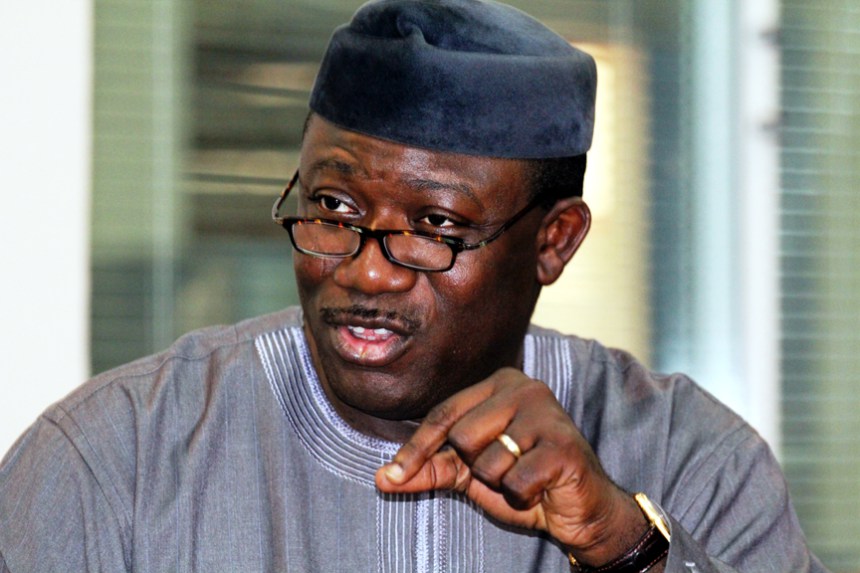The federal government has disclosed that Nigeria lost about $9 billion to illegal mining operation particularly from gold illegal exportation in two years.
This was disclosed by the minister of mines and solid minerals, Kayode Fayemi , after the Federal Executive Council ( FEC) meeting presided over by President Muhammadu Buhari at the Presidential Villa.
He said there was a significant improvement in the contribution of mining to the country’s GDP according to the National Bureau of Statistics ( NBS) report.
He said, “The memo presented to council has to do with contribution of mining to the GDP. In the latest figure of GDP, there is significant improvement industrial contribution after agriculture to that report as was released by the National Bureau for Statistics.

“NBS states that 8.97 per cent increase has happened and the bulk of the contribution from the industry is from mining and quarry activities.
“But the primary reason for this memo is the fact that mining could still do a lot more in terms of its contribution.
“NEITI has just released its report and that report made it clear that in 2014 and 2015, what we lost to illegal mining operation was somewhere in the region of about $9 billion particularly from gold illegal exportation. There were other things that were illegally taken out, lead, zinc, tin and coal.”
The minister recalled that in the roadmap of mining FEC approved last year, there was provision for the establishment of the Special Mines Surveillance Task Force.
He said the memo requested from council the approval of the procurement of 50 Hilux vehicles for the Special Mines Surveillance Task Force to enable them monitor and curb illegal mining activities in all the 36 states of the federation and the Federal Capital Territory (FCT).
He added that the memo seeks to support the collaboration between the state and federal governments via the mineral resources and environmental committees that the Mining Act has allowed to set up in all the states.
“So this memo went to council for the procurement of 50 Toyota Hilux vans for the sum of N987 million at a set piece of about N19.3 million per a vehicle. But it just forms part of an overarching framework because council also underscores the fact that this one vehicle per state cannot solve all the problems but in order to begin to tackle the issues.
“We need to start from somewhere and ultimately the goal is to ensure that we deploy technology to monitor the illegal activities across the length and breadth of the country and through that capacitate the security services,”he explained.
He stated that the Special Mines Surveillance Task Force was made up of all security agencies. The DSS, the Police, the Civil Defence, EFCC and the National Security Adviser’s Office.
“You may be aware that over the course of last year, the police have established Mines Police and we now have a commissioner of police in-charge of Mines Police. We have a commandant from the Civil Defence also exclusively deployed for mines activities.
“If we can stop the spate of illegal activities, not just by Nigerians but by Nigerians in collaboration with some foreigners, we will significantly improve the revenue that comes from that sector, increase the contributions to GDP, increase the royalty to government and also provide more jobs for our people.
“This is just the monitoring and curbing side of that work. The other side of reducing illegal and informal activities is the formalisation of small scale miners and artisan miners and you may all be aware that recently, we placed N5 billion in the Bank of Industry to support the activities of Artisanal and small scale miners to formalise their operations, form into cooperatives and then get more capacitated by government,” he said.
During his briefing, minister of water resources, Suleiman Adamu Kazaure , said his ministry and the FCT was seeking to take over the responsibility for managing, operation and maintenance of the Azure-Gira irrigation project.
He explained that the project was initiated to supply water primarily from Gurara dam to lower Usman dam by a distance of 75 kilometers with a three nester diameter pipeline recalling that the project was completed in 2008, but since then no effort was made to discharge the contractual obligation after the obligatory maintenance period or any effort to take over the project either by the ministry or FCT administration.
The minister stated that since last year, his ministry has been working to take over this pipeline in particular because it was very strategic and was meant to augment water supply during the dry season in Abuja.
According to him,”We believe after construction ,it doesn’t make sense for the project to remain in the hands of the contractor for another close 10 years now without our taking possession and being responsible for the operation and maintenance of the pipeline.
Before then , he noted that they had negotiated through the office of the national security adviser, to have 24- hour surveillance of the pipeline because of the strategic importance of the pipeline to abuja.
“The memo was approved and in the next 12 months we would have prepared our own personnel to take over the operation and maintenance of the scheme and for the contractor totally disengage from the project site after 10 years,” he said.
On his part, minister of trade and investment,Okechukwu Enelemah told State House correspondents that his ministry provided an update to FEC on the activities of the Presidential Enabling Business Environment Council on the work that had been done in the last months of June,July August,September and October .

He added that they also got approvals for two particular initiatives – The national action plan 2 and integrated operationalisation plan for executive order one .
According to him, his ministry presented a paper on incentives that was prepared by the Nigerian investment Promotion Commission(NIPC), and the Federal Inland Revenue Service (FIRS).
“On the update we updated the council on the significant development that has happened many of which you have achieved news on already, first we updated the council on the significant improvement of the Nigerian standing in the world bank on the ease of doing business rankings which you recall Nigeria moved by 24 places and was adjudged to be one of the top ten reforming countries in the world, so that information was provided as part of what happened during that period.
“Secondly we also updated the council on the second national action plan tagged NAP 2.0 to mobilise the MDAs to do more to consolidate the gains and also achieve more success in making doing business in Nigeria easier and investment in Nigeria more attractive.
“Thirdly we also updated the council on the work we are doing with states to expand ease of doing business to all the states in the federation beyond just Kano and Lagos States.
“Finally we also updated the council on an ongoing omnibus bill which we are working on with the national assembly to prepare an all encompassing bill that would address the constraints that businesses face am sure you are aware we worked national assembly to make the progress we made, in the sense that they passed two bills related to credit, one on mobile collateral and the other on credit bill and data, those two bills were very instrumental in Nigeria’s progress,’ he said.
He said his ministry got approval from the council on the two recommendations, one on the national action plan which again was built on the National Action plan one that was done earlier in the year and that approval was to continue the good work that the Enabling Business Activities Environment secretariat was doing with all the MDAs under the oversight of the Presidential Enabling Business Environment Council.
“We also got approval for the integrated operationalisation plan which is a plan to further implement and deepen executive order one which as you know is on transparency and the principle of one governance.
“We also present the compendium of investments incentive to Nigerian, what this incentive compendium seeks to do is the FIRS and the NIPC came together to publish all the incentives that are available and obtainable for investors in Nigeria. That report has been formally,” he stated.
